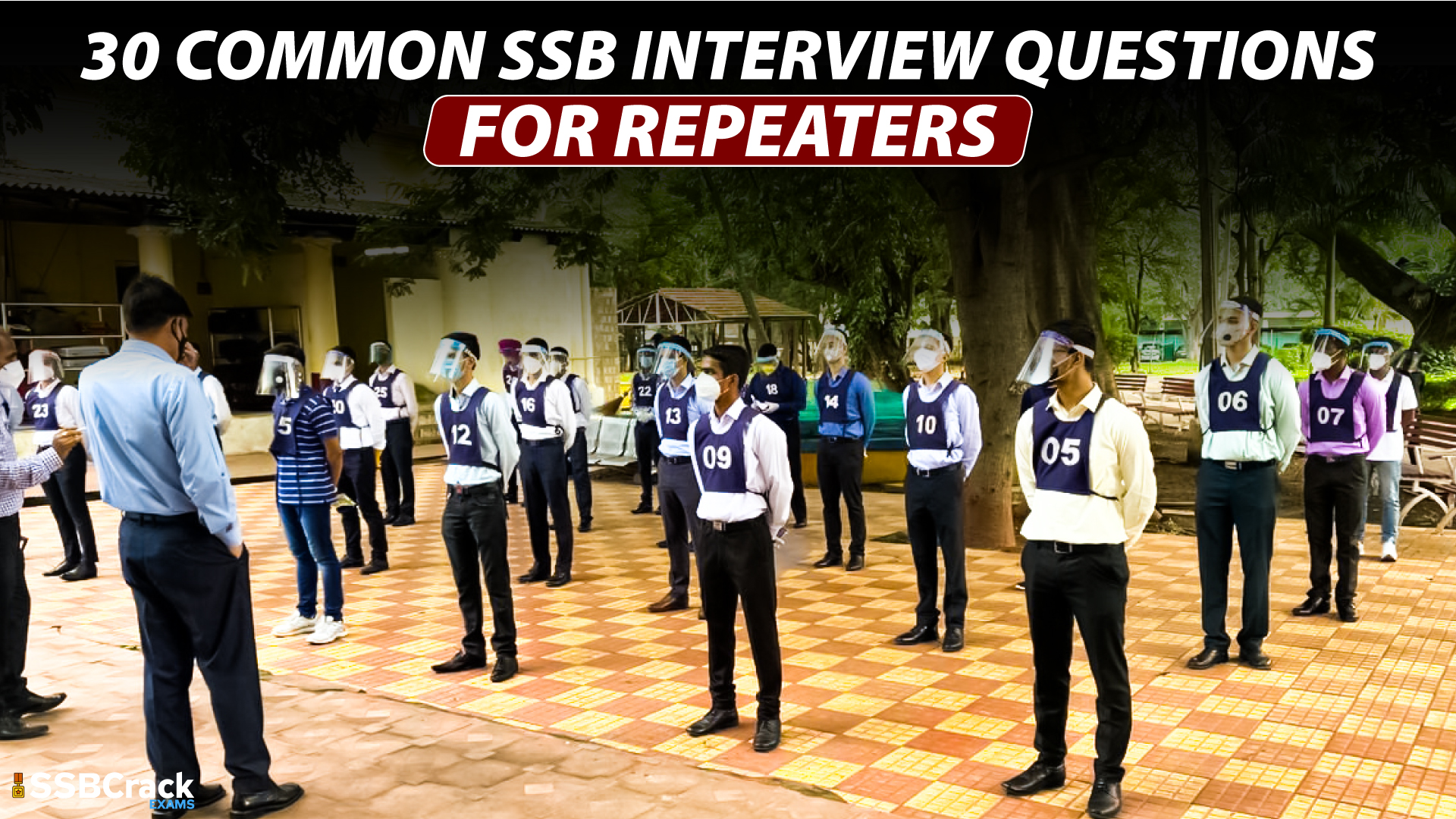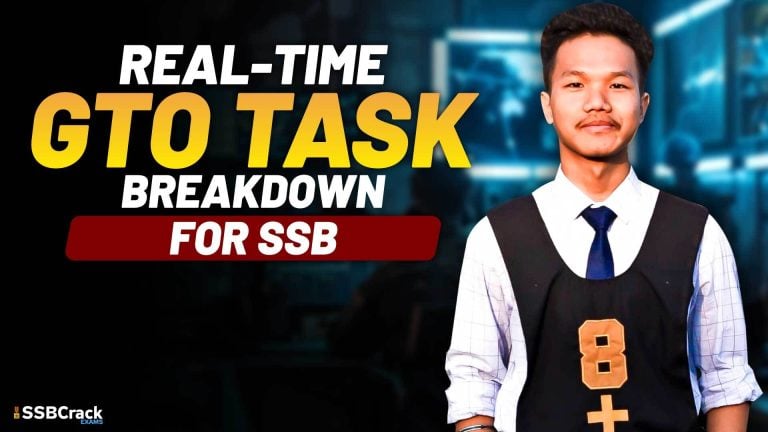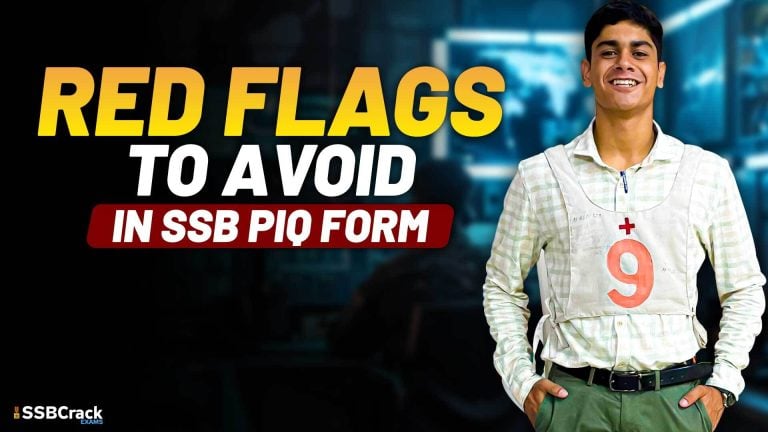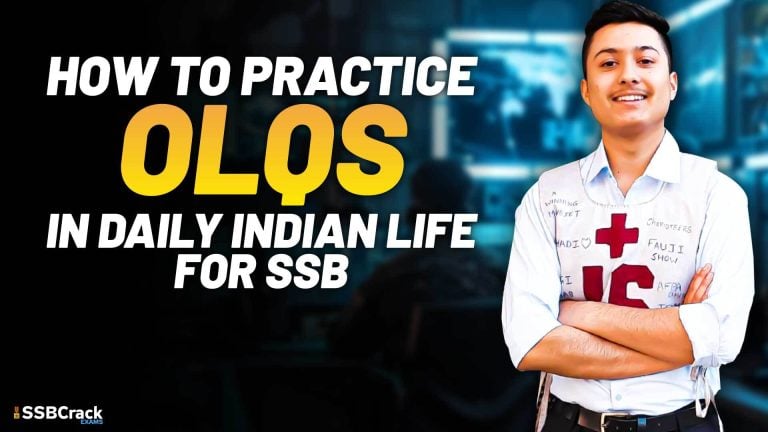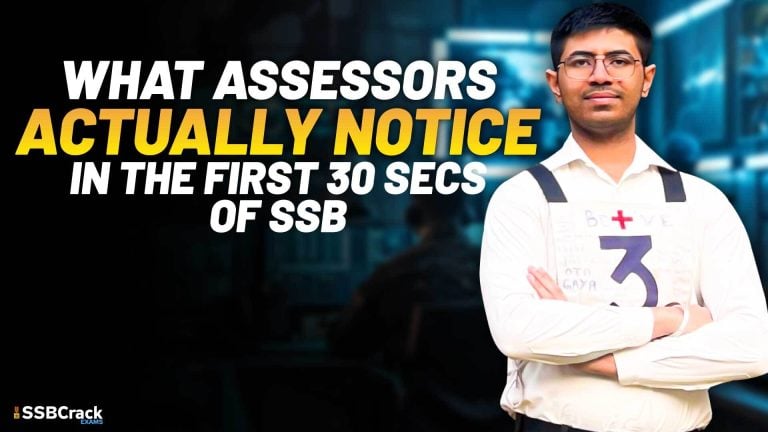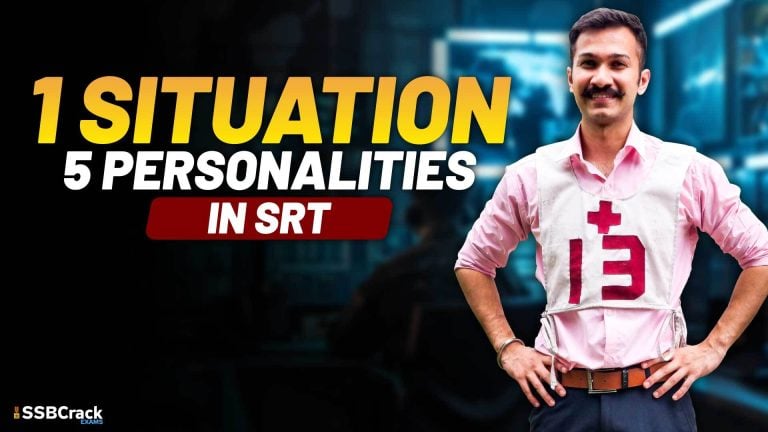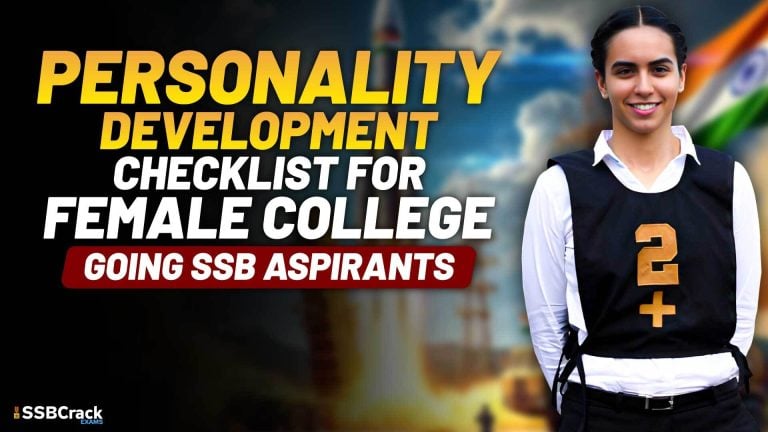In Services Selection Board (SSB) interviews, candidates who were not selected in previous attempts are known as “repeaters.” These candidates fall into two categories: those who were “screened out” during Stage 1 (screening) and those who were “conferenced out” during Stage 2. Understanding what to expect as a repeater is crucial for success in subsequent attempts.
The SSB interviewing officers are particularly interested in how repeaters have improved since their previous attempts. They want to see growth, self-awareness, and dedicated preparation. This article covers 30 common questions that repeaters face during SSB interviews, along with thoughtful sample answers to help you prepare effectively.
Understanding Repeater Categories
Before diving into the questions, it’s important to understand how repeaters are grouped:
- Screened Out Candidates: Those who did not pass the Stage 1 screening test
- Conferenced Out Candidates: Those who completed all Stage 2 testing but were not recommended in the final conference
During SSB interviews, screened out candidates are typically grouped with other screened out candidates, while conferenced out candidates are grouped separately. This grouping helps assessors tailor their approach based on your previous experience level.
30 Common SSB Interview Questions for Repeaters (with Sample Answers)
1. Why were you not selected in your previous SSB?
Sample Answer: “In my previous attempt, I believe my lack of clarity in communication was a major drawback. During group discussions, I had good ideas but couldn’t articulate them effectively. Additionally, I noticed I was hesitant during the obstacle course due to inadequate physical preparation. Since then, I’ve joined Toastmasters to improve my communication skills and follow a rigorous fitness regimen.”
2. What special preparation have you done this time to clear SSB?
Sample Answer: “After analyzing my previous performance, I identified three key areas for improvement: situation handling, physical fitness, and knowledge of defense forces. I’ve dedicated three months to improving these aspects by reading extensively about military operations, practicing GTO tasks with peers, and following a structured fitness program. I’ve also maintained a journal to track my progress and areas needing further improvement.”
3. What are your weaknesses and what have you done in the previous months to overcome them?
Sample Answer: “My main weakness was time management during high-pressure situations. To address this, I’ve been practicing time-bound activities daily and participating in mock tests. I’ve also been working on my tendency to overthink by practicing mindfulness techniques. These efforts have helped me become more decisive and efficient under pressure.”
4. What did you perform best during your previous SSB?
Sample Answer: “I performed well in the psychological tests, particularly the TAT and WAT, where I demonstrated creativity and positive thinking. The interviewing officer also appreciated my honest self-assessment. This gave me confidence that my core personality traits align with what the services are looking for, motivating me to improve in other areas.”
5. How many SSB attempts do you have left?
Sample Answer: “I currently have four attempts remaining. However, I’m approaching this attempt with full dedication as if it were my last. I believe in quality of preparation rather than counting on multiple attempts.”
6. What is your career plan if you get rejected this time too?
Sample Answer: “While I remain optimistic about this attempt, I believe in having contingency plans. If not selected, I’ll pursue my engineering career while continuing to develop qualities valued by the armed forces. I’ll apply again after thorough preparation, but meanwhile would also contribute to society through my technical expertise and volunteer with organizations supporting veterans.”
7. Tell me something about this selection center and city.
Sample Answer: “This selection center in Allahabad was established in 1982 and is known for its rigorous assessment process. The city itself has significant historical importance, being located at the confluence of the Ganges, Yamuna, and mythical Saraswati rivers. I’ve noticed the discipline and efficiency with which this center operates, which itself reflects the values of the armed forces.”
8. What are your strengths? Tell me about a situation where you have used your biggest strength.
Sample Answer: “My biggest strength is remaining calm under pressure. During an inter-college technical competition last year, our team faced a major setback when our project malfunctioned just hours before the presentation. While others panicked, I organized the team into troubleshooting groups, identified the issue, and guided the repair process. We not only presented successfully but secured second place. This experience reinforced my ability to lead effectively during crisis situations.”
9. Who is your role model and why?
Sample Answer: “Field Marshal Sam Manekshaw is my role model because of his exceptional leadership during the 1971 war and his moral courage to stand by his convictions even when faced with political pressure. I particularly admire how he valued his soldiers’ lives over hasty military action, insisting on proper preparation despite pressure for immediate action. His famous quote, ‘I wonder whether those of our political masters who have been put in charge of the defence of the country can distinguish a mortar from a motor’ demonstrates his straightforward approach and commitment to professional integrity.”
10. Which arm are you aspiring for, or which regiment will you join if you get selected?
Sample Answer: “I’m aspiring to join the Infantry, specifically the Rajputana Rifles regiment. Their motto ‘Veer Bhogya Vasundhara’ (The brave shall inherit the earth) and their distinguished history in operations like Kargil resonates with my values of courage and patriotism. The regiment’s emphasis on close combat skills and adaptability across terrains aligns with my physical abilities and technical background.”
11. How do you face rejections and start preparing again?
Sample Answer: “I view rejections as learning opportunities rather than failures. After my previous SSB rejection, I took a week to process my emotions, then conducted a thorough analysis of my performance. I sought feedback from seniors who cleared SSB and identified specific improvement areas. I believe in the Japanese concept of ‘Kaizen’ – continuous improvement – and have created a structured improvement plan with weekly milestones to track progress.”
12. Why do you want to join the Army/Navy/Air Force?
Sample Answer: “My desire to join the Indian Air Force stems from my fascination with aviation technology and the strategic importance of air power in modern warfare. More importantly, I believe in the Air Force’s core values of ‘Mission, Integrity First, and Excellence in All We Do.’ Having grown up in a border area, I’ve witnessed firsthand the respect and security that the armed forces provide to citizens. I want to contribute to this legacy while challenging myself in a profession that demands technical excellence and leadership skills.”
13. Tell me about the organizational structure, new weapons inducted, and battles your preferred service has fought.
Sample Answer: “The Indian Army follows a hierarchical structure with the Chief of Army Staff at the apex, followed by Vice Chief and Deputy Chiefs. The Army has seven commands including Northern, Eastern, Western, Central, Southern, South-Western, and Army Training Command.
Recently, the Army has inducted weapons like the K9 Vajra self-propelled howitzer, M777 ultra-light howitzers, and Spike anti-tank guided missiles. The indigenous Arjun MBT Mk-1A has also been a significant addition.
The Army has fought in major operations including the 1947, 1965, and 1971 Indo-Pak wars, Operation Vijay (Kargil War), and various counter-insurgency operations like Operation Rhino and Operation All Clear. Each of these engagements has contributed significantly to our military doctrine and strategic approach.”
14. Did you join any coaching institute? Tell me about the experience and learnings.
Sample Answer: “Yes, I joined a 45-day SSB coaching program at ABC Institute in Delhi. The experience was valuable not just for SSB preparation but also for personality development. The most significant learning was understanding the importance of genuine personality traits rather than rehearsed answers. The mock interviews and GTO tasks provided practical experience that helped me identify my strengths and weaknesses. The instructors, mostly ex-SSB officers, provided constructive feedback which helped me realize that consistency in personality across all tests is crucial.”
15. What is your daily routine? What do you like to do during your free time?
Sample Answer: “I start my day at 5:30 AM with a 5 km run followed by strength training. After breakfast, I dedicate 3 hours to technical studies related to my engineering field, followed by 2 hours of SSB-specific preparation. Afternoons are for current affairs and defense news updates. In the evening, I participate in group discussions with fellow aspirants to improve my communication skills.
During free time, I enjoy reading military history and autobiographies of decorated officers. I also volunteer at a local NGO teaching mathematics to underprivileged children on weekends, which helps me develop patience and communication skills while contributing to society.”
16. What motivates and demotivates you, and how do you overcome demotivation?
Sample Answer: “I’m motivated by challenges that push me beyond my comfort zone and by the opportunity to make a meaningful difference. The thought of serving the nation while leading troops motivates me tremendously.
I get demotivated when I face repeated setbacks despite sincere efforts. When demotivated, I remind myself of my core purpose and break down large goals into smaller achievable tasks. I also seek inspiration from biographies of officers who faced multiple rejections before success. Physical exercise helps clear my mind, and discussions with mentors provide new perspectives. I’ve learned that demotivation is temporary, and persistence through these phases is what ultimately leads to success.”
17. What is your biggest fear in life?
Sample Answer: “My biggest fear is not living up to my potential and letting down people who depend on me. I believe each of us has unique capabilities, and not utilizing them fully would be a disservice to ourselves and society. To overcome this fear, I focus on continuous self-improvement and set challenging but achievable goals. I also practice making decisions under pressure to build confidence in my abilities. This fear, while present, actually drives me to push my boundaries rather than limiting me.”
18. When did you decide to join the defense forces, and what have you done to prepare yourself?
Sample Answer: “I decided to join the defense forces during my second year of college after participating in a National Integration Camp where I interacted with several officers. Their sense of purpose and leadership qualities inspired me.
Since then, I’ve systematically prepared myself by improving my physical fitness through daily running and strength training. I joined the college NCC unit to understand military discipline and participated in adventure sports like trekking and rappelling to build courage and resilience. I’ve also developed my knowledge about international relations and military history through regular reading and discussions with serving officers whenever possible.”
19. How are you different? Give me some reasons to select you.
Sample Answer: “What distinguishes me is my combination of technical problem-solving abilities and people management skills. During my internship at XYZ company, I not only resolved a critical software issue that had delayed production but also successfully coordinated with multiple departments to implement the solution.
I believe my resilience sets me apart – having faced and overcome significant financial hardships in my family while maintaining academic excellence demonstrates my determination. Additionally, my experience leading diverse teams in college festivals has honed my ability to understand various perspectives and unite people toward common goals – skills essential for an officer.
Finally, my continuous self-improvement since my last SSB attempt shows my commitment to growth and adaptability, qualities vital for military leadership.”
20. Whom do you like the most, your mother or father? Tell me about the qualities you like and dislike in both of them.
Sample Answer: “I deeply respect both my parents for their unique contributions to my upbringing. My father’s discipline, analytical thinking, and principled approach to life have shaped my core values. However, his perfectionism sometimes makes it difficult for him to delegate tasks, which I’ve learned to approach differently.
My mother’s empathy, resilience, and ability to manage multiple responsibilities efficiently have inspired me greatly. Her tendency to worry excessively is something I understand comes from care, though I’ve adopted a more balanced approach to concerns.
Both have complementary strengths that have provided me with a well-rounded upbringing. I’ve consciously tried to incorporate their positive qualities while developing my own approach to challenges.”
21. Situational question: What will you do if a lion is coming toward you in the jungle?
Sample Answer: “If confronted by a lion, I would maintain my composure and avoid panicking, as fear can trigger predatory instincts. I would stand my ground, make myself appear larger by raising my arms, and maintain eye contact without staring aggressively. Backing away slowly while facing the lion would be my strategy, avoiding sudden movements or turning my back.
If the lion continues to approach, I would speak firmly and loudly while looking for nearby trees to climb or objects to use as a barrier. The key is to demonstrate that I’m not prey while avoiding actions that might be perceived as threatening. This balanced approach of caution without panic reflects how I would handle high-pressure situations as an officer.”
22. Did you make friends during your previous SSB? Tell me about them.
Sample Answer: “Yes, I formed meaningful connections during my previous SSB, particularly with Rahul from Maharashtra and Priya from Kerala. Rahul’s analytical approach to problem-solving during GTO tasks was impressive, and I learned from his methodical decision-making process. Priya’s ability to articulate complex ideas simply during group discussions taught me the importance of clear communication.
We’ve stayed in touch, sharing preparation strategies and motivating each other. These friendships have been valuable not just for SSB preparation but also for understanding diverse perspectives from different parts of India. I believe such connections reflect the camaraderie essential in defense services, where trust and mutual respect form the foundation of effective units.”
23. Rapid-fire questions about education and competitive exams
Sample Answer: “I completed my schooling at DAV Public School, Ranchi, where mathematics and physics were my favorite subjects while I found literature challenging but grew to appreciate it. I chose PCM with Computer Science in Class 11 because of my aptitude for logical reasoning and interest in technology. I’ve appeared for JEE Mains, securing an AIR of 15,000, and UPSC NDA, clearing the written exam twice. These experiences taught me to manage time effectively under pressure and approach problems systematically.”
24. Do you have a girlfriend/boyfriend? If yes, tell me about them. If no, what qualities will you look for in a future partner?
Sample Answer: “I don’t have a girlfriend currently as I’ve been focused on my career goals. In a future partner, I would value intellectual compatibility, emotional resilience, and shared core values. I believe mutual respect and effective communication are foundations of any strong relationship. I admire independence and someone who pursues their own goals while being supportive of mine. A sense of humor and adaptability would be important, especially considering the unique challenges of military life including frequent relocations and periods of separation.”
25. If I give you ₹50,000, how will you spend it?
Sample Answer: “I would allocate the ₹50,000 purposefully: ₹20,000 for skill development by enrolling in an advanced programming course to enhance my technical capabilities which would be valuable in modern warfare technology. ₹15,000 would go toward health and fitness by investing in quality exercise equipment for consistent physical training. I’d use ₹10,000 to help fund my younger sister’s education, as family responsibility is important to me. The remaining ₹5,000 would be saved as an emergency fund, reflecting my belief in financial prudence and preparedness for unforeseen circumstances.”
26. What is the meaning of your name? Who gave you this name and why?
Sample Answer: “My name, Arjun, was given by my grandfather, a history professor. It means ‘bright,’ ‘silver,’ or ‘white’ in Sanskrit. He named me after the legendary archer from the Mahabharata who symbolizes focus, skill, and adherence to duty. My grandfather hoped I would embody these qualities, particularly Arjun’s ability to concentrate singularly on his target while blocking out distractions – what’s described as ‘seeing only the eye of the bird.’
This name has been meaningful in my life, often reminding me to maintain focus on my goals despite obstacles. It’s interesting how a name can become an informal guide for one’s approach to challenges.”
27. Tell me about the social services you have done in your life so far.
Sample Answer: “My involvement in social service began in school when I helped organize relief efforts after floods affected our district. In college, I joined an NGO called ‘Shiksha’ where I spent two years teaching mathematics and science to underprivileged children every weekend. The experience was transformative as I witnessed how consistent mentorship could change these children’s outlook and academic performance.
More recently, I’ve been volunteering at a local old age home, spending time with residents and helping digitize their medical records for better healthcare coordination. During the pandemic, I coordinated a neighborhood initiative to deliver essentials to elderly residents who couldn’t venture out. These experiences have taught me the importance of empathetic leadership and community responsibility – values that align perfectly with an officer’s role in both warfare and peacetime operations.”
28. Tell me about all the extra-curricular activities you participated in. Did you join NCC or NSS?
Sample Answer: “I was an active NCC cadet for three years during college, attaining ‘B’ certificate. Through NCC, I participated in the Republic Day Camp in Delhi and a mountaineering expedition in Uttarakhand, which developed my leadership skills and physical endurance.
Beyond NCC, I represented my college in debate competitions, winning state-level championships twice. I was also part of the college basketball team that reached the semi-finals in inter-university tournaments. Additionally, I learned Western classical piano for six years, which taught me discipline and attention to detail.
In my final year, I led the technical society, organizing workshops and competitions that enhanced my event management and team coordination abilities. These varied activities have helped me develop a well-rounded personality combining physical fitness, communication skills, and organizational capabilities.”
29. Tell me about the biggest thing in your life that you are proud of.
Sample Answer: “The achievement I’m most proud of was establishing a disaster preparedness program in five villages near my hometown after we experienced devastating floods. Recognizing the need for organized community response, I researched disaster management protocols and collaborated with local authorities to develop a practical framework.
Over six months, I trained 150 villagers in basic first aid, evacuation procedures, and emergency communication. When flash floods occurred the following year, our trained volunteers successfully evacuated vulnerable residents and provided immediate assistance before external help arrived.
What makes this accomplishment meaningful isn’t just the lives potentially saved, but how it demonstrated that systematic training and community coordination can transform ordinary citizens into effective first responders. This experience reinforced my belief in the power of organized leadership and proper training – principles that resonate deeply with military values.”
30. What qualities make a good officer?
Sample Answer: “A good officer embodies several core qualities. First is unwavering integrity – the moral courage to do what’s right even when difficult. Second is empathetic leadership – understanding subordinates’ strengths, weaknesses, and motivations to bring out their best performance.
Technical competence is crucial, as officers must make sound decisions based on tactical knowledge and situational awareness. Equally important is adaptability – the ability to adjust plans when circumstances change without losing sight of the objective.
Communication skills are vital, both for issuing clear orders and for representing soldiers’ needs to higher command. Physical and mental resilience enables officers to lead by example and maintain composure under pressure.
Finally, a good officer possesses a genuine sense of responsibility – understanding that their decisions impact not just the mission but the lives of those under their command. These qualities together create leaders who earn both respect and trust from their troops.”
Conclusion
Approaching your repeat SSB attempt with honesty, self-awareness, and evidence of improvement will significantly enhance your chances of success. While the questions above are commonly asked to repeaters, remember that there are no fixed “correct” answers. The interviewing officers are looking for authenticity, consistency, and alignment with the officer-like qualities required in the defense forces.
Focus on genuine self-reflection rather than memorizing answers. Demonstrate how you’ve used your previous experience to grow and develop. With thorough preparation and the right mindset, your repeat attempt could be your path to success.
Remember, persistence and continuous improvement are themselves qualities valued in military leadership. Your determination to succeed despite previous setbacks speaks volumes about your character and commitment to serving the nation.
Also Read:
